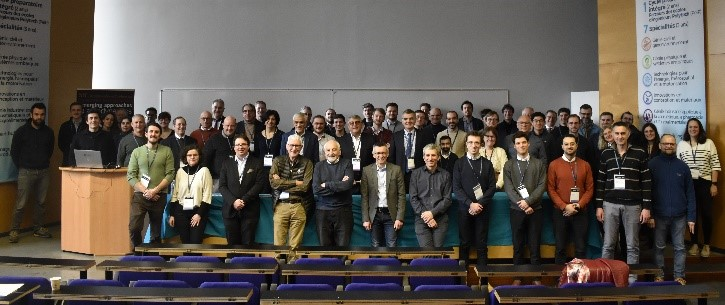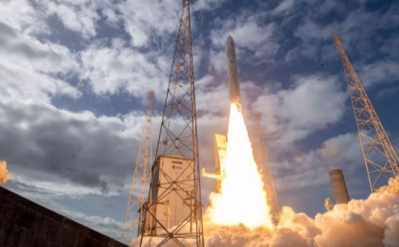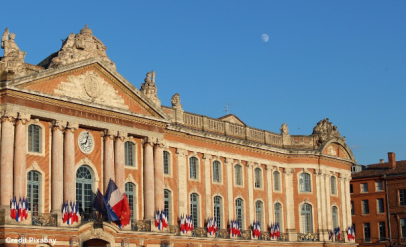News

AERO2024 CONFERENCE REPORT
by Eric Chaput, Chairman of the 3AF Aerodynamics Technical Committee.
Doctorate in Energetics from the University of Poitiers (1983), Post-doc at the Laboratoire d'Etudes Aérodynamiques de Poitiers (Institut P') in wake turbulence modeling and experimental study of supersonic ramp flow (CEAT 1983 to 1986). Joined Aérospatiale-Lanceurs in 1987 as a supersonic and hypersonic numerical aerodynamics engineer for the Ariane 5 and Hermès Space Shuttle programs. Joined Airbus in Toulouse in 1992, in charge of developing CFD methods for commercial aircraft from the A330, A340 and A380 to the A350. Coordinator of research, methods and tools for the Aerodynamics Department until 2002. Senior Expert Aerodynamic Simulation (2002) and Technical Expert Leader Capabilities of the Flight-Physics competence center (Aerodynamics, Loads and Aero-elasticity, Mass, Aircraft Performance, Flight Dynamics, and Multidisciplinary Optimization) from 2006 to 2020. Managing Director of the Centre Européen de Recherche et Formation Avancée en Calcul Scientifique (CERFACS) from 1998 to 2020. Member of the Executive Committee for cooperative software development: - Aerospatiale-CERFACS-EPFL-KTH for the NSMB code until 1999; - Airbus-Safran-ONERA for the ONERA_elsA code, until 2019; - Airbus-DLR-ONERA for the CODA code; - IRT Saint-Exupéry, MDO platform for multidisciplinary optimization and analysis (GEMSEO methodology and software). Chairman of the 3AF Technical Commission for Applied Aerodynamics from 2000 to 2003, and since January 2023. Retired from Airbus in April 2021.

The 58th 3AF International Conference on Applied Aerodynamics (AERO2024) was held from March 27 to 29 in Orléans, hosted by the Polytechnic School of the University of Orléans, or Polytech Orléans. The welcome address was given by Régine Weber, Director of Polytech, who presented the Université d'Orléans and the multi-skills training offered by Polytech engineers, particularly in the fields of energy, aerospace and motorization technologies. The opening ceremony continued with a speech by the Director of the PRISME Research Laboratory and President of 3AF's Groupe Régional Centre, Mr. Azeddine Kourta, who was hosting the Conference. The Conference Chairman, Mr. Eric Chaput, then introduced the 3AF Association and the Aerodynamic Technical Commission, which has been organizing the annual applied aerodynamics symposium for the past 60 years. This year's theme was dedicated to "Emerging Approaches in Aerodynamics", particularly those arising from the massive exploitation of data, whether derived from high-fidelity numerical simulations, advanced wind tunnel testing or innovative flight test measurements. Data-driven modeling, machine learning and artificial intelligence were among the most advanced topics presented by the speakers.

There were ninety-seven participants from 11 countries, including France (68), the UK (12), the USA (4), Canada (3), Germany (3), Austria (2), Holland, India, Switzerland, Turkey and Pakistan. The majority were researchers from university laboratories or research institutes, and thirty representatives from industry and one government agency (Airbus, Boeing, Dassault, MBDA, Rolls-Royce, Safran, Turkish Aerospace, DGA). The symposium proceeded according to plan, with a total of five plenary lectures and eleven scientific sessions featuring fifty-six papers. The five plenary lectures, given by Mr. Olivier Marquet of ONERA, on Data Assimilation Analysis and Stability of Medium Turbulent Flows, by Mr. Gianluca Iaccarino, Director of the ICME Institute at Stanford University, on Autoencoders for Aerodynamics - Predictions by Self-Learning with Confidence Intervals, by Mr. Laurent Cordier, of ONERA, on Data Assimilation Analysis and Stability of Medium Turbulent Flows, and by Mr. Gianluca Iaccarino, Director of the ICME Institute at Stanford University, on Autoencoders for Aerodynamics - Predictions by Self-Learning with Confidence Intervals, were very much appreciated by the participants. Laurent Cordier, Institut P' de l'ISAE-ENSMA, on Flow Control in Aerodynamics - From physical models to a data-driven approach, by M. Xavier Bertrand from Airbus, Avions Commerciaux, on Deep Generative Models in Aircraft Aerodynamics at Airbus, and by Ms Paola Cinnella from Sorbonne University's Institut Jean-Le-Rond-d'Alembert, on Machine Learning-Assisted Turbulence Modeling. The eleven scientific sessions addressed cutting-edge research in the fields of innovative experimental techniques, multiphysics coupling, mesh adaptation, high-speed flows, optimization with reduced models, flow control, drag decomposition, real-time data, unsteady flows, machine learning for simulation and turbulent flows and aerodynamic design (AERO2024 Program): https://www.3afaerodynamics.com/images/DOCUMENTS/AERO2024_ PRELIMINARY_PROGRAMME.pdf Two companies, EVO Mesure and PCB Piezotronics, specializing in measurement instrumentation, particularly for wind tunnel testing, exhibited their products with demonstrations that were much appreciated by participants throughout the conference. Excellent local logistics were provided by our colleagues from Polytech Orléans, Mr. Azeddine Kourta, Mr. Nicolas Mazellier and Mr. Cédric Raibaudo, in support of the 3AF team on site, led by Mr. Michel Assouline and Ms. Aude Lurbe. The conference was held in an excellent atmosphere, with plenty of opportunity for exchange and discussion during coffee breaks and on-site lunches. In addition to its rich scientific program, the conference offered a range of convivial events. The traditional welcome cocktail, offered by Orléans City Hall, took place in the prestigious Hôtel Groslot, under the auspices of Mr. Michel Assouline, General Manager of 3AF, and Mr. Azeddine Kourta, President of 3AF's Groupe Régional Centre.

Mr. Florent Montillot, First Deputy Mayor of Orléans, in charge of relations with the University, gave a remarkable speech. Paying tribute to Orléans City Council's commitment to research into the decarbonization of transport, he also emphasized the historical dimension of the site, recalling that the Hôtel Groslot had welcomed the Kings of France and Joan of Arc. The gala dinner took place at the Château de Meungsur-Loire, preceded by a tour of the château which was much appreciated by participants. During the gala dinner, the "Jean Délery" prize for the best paper at the 57th 3AF Applied Aerodynamics 2023 Conference was awarded to Carmen Riveiro-Moreno (ONERA).

The conference was rounded off by technical tours, which were much appreciated by the many participants. Viviana Lago, Head of Test Facilities at the CNRS ICARE laboratory, presented the PHEDRA non-equilibrium plasma wind tunnel, the MARHY hypersonic rarefied adaptable Mach wind tunnel and the EDITH wind tunnel (ICARE test facilities): https://www.3af-aerodynamics.com/ images/WindTunnels_ICARE.pdf Pierre-Yves Passaggia presented the PRISME laboratory's S1 subsonic wind tunnel, a Lucien Malavard wind tunnel for studying flows in road transport and aeronautics and renewable energies, and resources dedicated to studying hydrogen and ammonia combustion (PRISME test facilities): https:// www.3af-aerodynamics.com/images/WindTunnel_ engines_PRISME.pdf The 58th 3AF Applied Aerodynamics Conference AERO2024 was a success, and our thanks go to Polytech Orléans for its support and the quality of its welcome, to the session chairs, speakers and all participants, and to the staff of the PRISME and ICARE laboratories. The next conference will focus on Unsteady Flows and will be held in Strasbourg from March 24 to 26, 2025.









No comment
Log in to post comment. Log in.